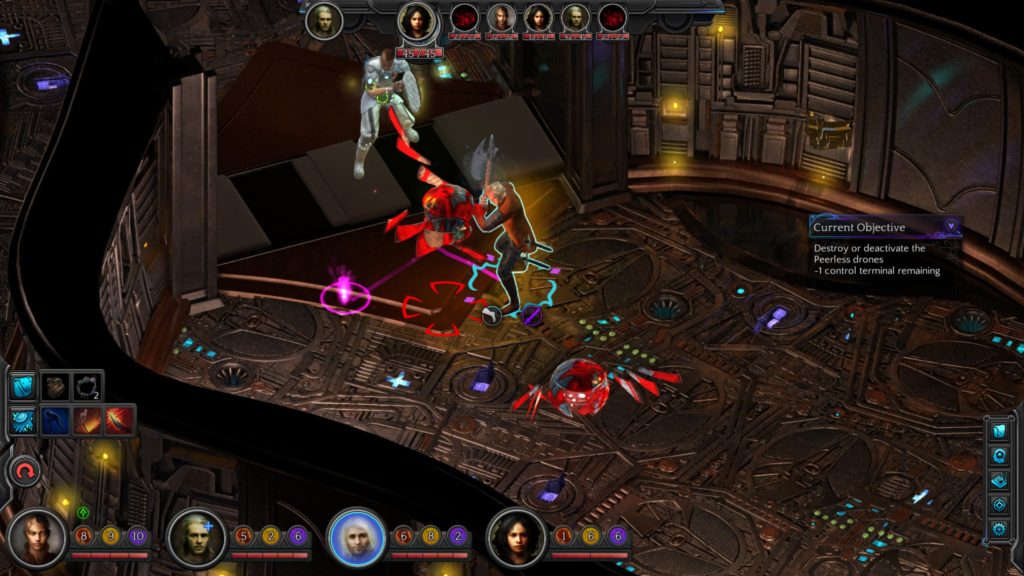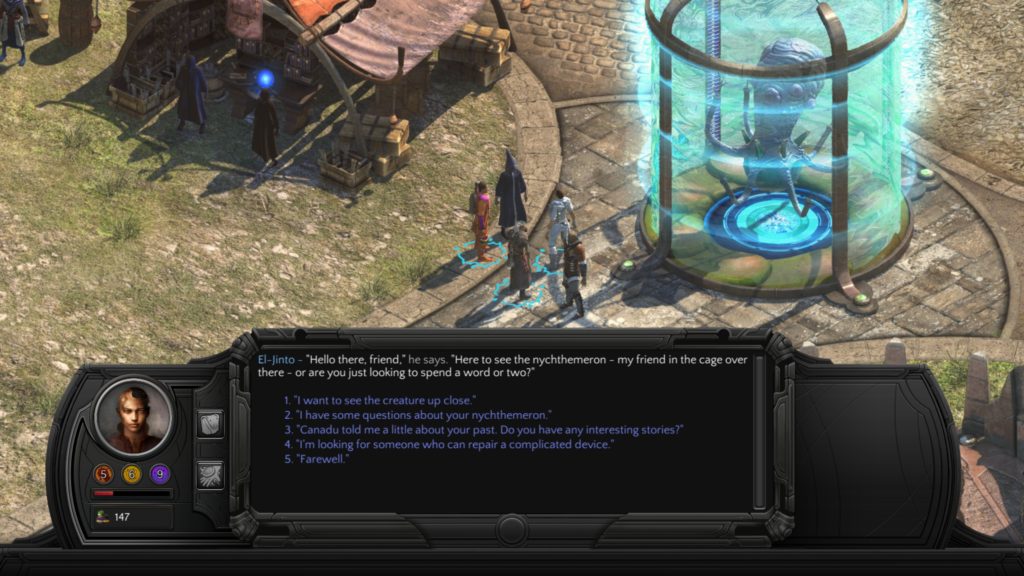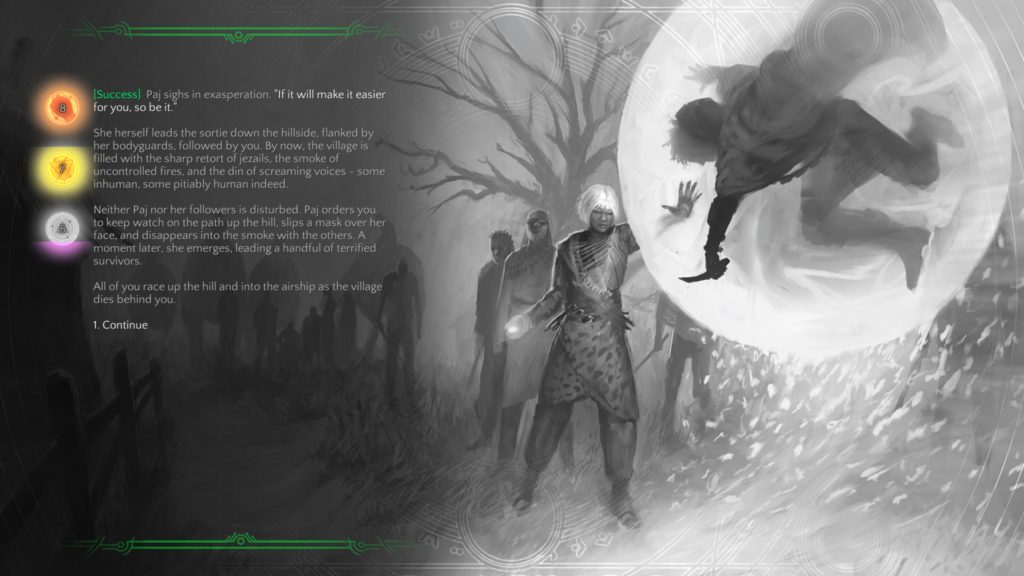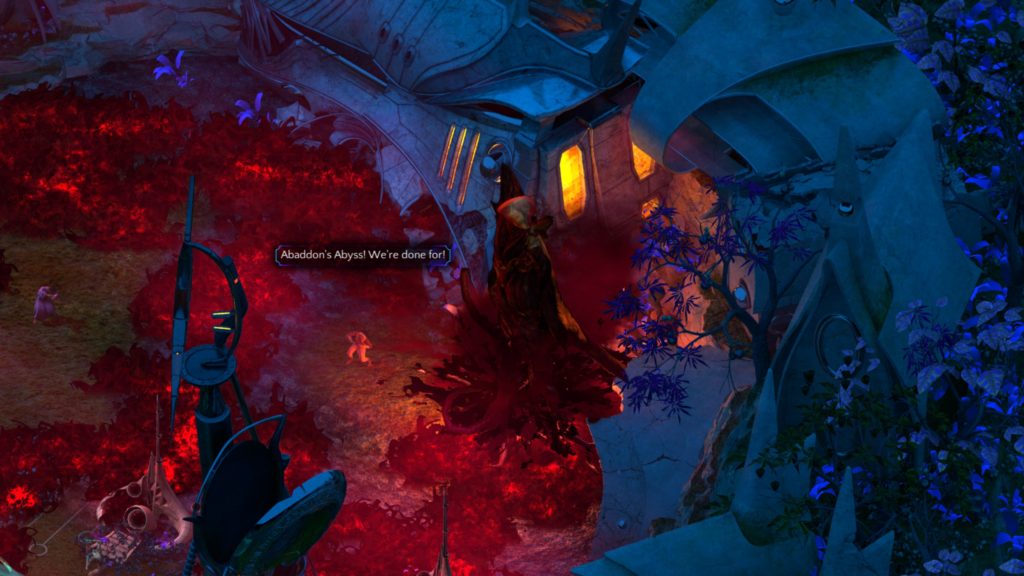
Like for so many other people, playing Planescape: Torment was for me a uniquely memorable experience, one of the few games I have ever played whose story I can still recall with startling clarity and emotion. Naturally when they announced this game as a spiritual successor, I was intrigued but also skeptical. I felt that I had to play this eventually out of loyalty to the original game and having done so, I’m left with mixed feelings. This does feel a lot like the game that inspired it, perhaps too much so because it seems to be trying too hard, yet at the end of the day it still feels inferior in almost every way.
The game begins with the main character not knowing who he is or where he is. Soon enough he learns that he is castoff. In this Ninth World filled with the detritus of past civilizations and poorly understood technological devices, a being known as the Changing God has achieved a sort of immortality by creating a succession of new bodies to host his mind. However each body that he leaves behind develops a mind of its own and they are known as castoffs. You also learn that the Changing God and all of the castoffs is being hunted by a powerful being known as the Sorrow. Much of the plot deals with learning how to defeat the Sorrow with the aid of a device that was your sire’s last project. Along the way you of course make both friends and enemies and most importantly of all recover memories of the doings of your sire as well as your siblings, many of whom are involved in a terrible Endless Battle between the forces loyal to the Changing God and those loyal to the very First Castoff.

This is fully featured traditional RPG with side-quests, character progression, combat mechanics and so on but it’s substantially shorter than most modern RPGs and has very little combat. There is in fact so little of it, and even less if you actively try to avoid fights, that it feels a little silly that there even are combat mechanics or that you’re expected to collect gear and build up characters in preparation for it. Even so some fights are unavoidable so you can’t just ignore that part of the game. The game features powerful one-use consumables called cyphers that include mechanics to discourage you from stocking up on them so that helps make fights easier and they’re generally not that hard anyway. One wonders why even have combat at all and not just make it just another kind of challenge like the persuasion or quick fingers checks that are everywhere. It is a good example of why this is a game that is full of messy compromises and legacy mechanics that keep it from being a singular, coherent vision.
Torment is first and foremost, a game that involves reading a lot. Sure you have the graphics that bring the Ninth World to life but mostly you reading the descriptions of the things and places around you to understand what it is you’re seeing. There’s dialogue of course, lots and lots of it. Finally there are the meres, which are basically text-only adventures. Over the course of the game you gain access to devices that record memories of past events, most often from the perspective of someone else, and activating one of these allows you to relive those events. During these text adventures as well as in normal conversations, your skills can influence what you can perceive and what options are available to you. The skill check system which allows you to spend resources to improve your chances of passing challenges are in full effect as well. This is why the combat system feels like such an outlier when all of the other game mechanics use this system.

This setting is apparently an established one instead of something made just for this game. For those completely new to it, like me, there is a lot to take in especially when you add in the craziness of being a castoff of the Changing God. I have to say that it was too much for me as there is just too much strangeness going on. This is a setting with time travel, reality warping, machine intelligences, interdimensional travellers, and a landscape absolutely saturated with all manner of unknowable devices. There’s no baseline to work off of and everything is unfathomably weird. After a while I just stopped caring about this crewmember of what is apparently a starship or that species reproduces or how this meat vendor has sold the same three pieces of meat for decades. In Planescape: Torment, Sigil was a pretty weird place too but you understood it as the confluence of multiple other worlds, many of which are perfectly ordinary fantasy settings. The existence of that baseline is what made the weirdness of Sigil stand out and still be comprehensible. Here it’s anything goes, so much so that nothing is surprising anymore and it feels like being weird just for the sake of being weird.
Finally let’s talk about the main story and that of the side quests including of course those of your companions. The parallels with Planescape: Torment is obvious up to and including mention of a huge and endless war and multiple incarnations of the same person. The problem is that nearly as bit of the story feels inferior and less significant than the equivalent in the original. The motivation of your sire, the Changing God, here is markedly different than that of the Nameless One, but once everything is revealed, it all feels rather small and underwhelming. It’s the same with the companions and sidequests. Out of all of the companions, I thought that only Rhin felt really interesting. Each companion has tragic backstories which is par for the course but their stories are related in abrupt bursts and most of them have few things to say about your own problems or those of the other companions.

I do like that the game tries to shy away from having outcomes that are unambiguously good for everyone involved. Often you’re forced to settle for an outcome that you can live with rather than one that makes everyone happy. Plus it is quite impressive how much backstory there is in everything, including all of the weird little oddities that you can pick up. But overall it feels like it’s chasing the coattails of Planescape: Torment all the time and never quite reaching what the older game achieved. It actually is a solid game in its own right and I do like its conflict resolution system but I do feel that it should have been braver about being its own game and doing away with older RPG conventions and tropes where needed. I haven’t played Disco Elysium yet but I will one day and from what I understand it is everything that this game aspires to be.